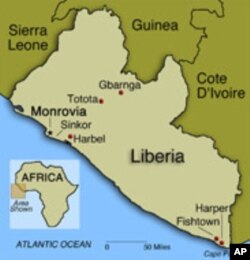Liberia’s Minister of Planning and Economic Affairs has said the government of President Ellen Johnson Sirleaf believes the Liberian Diaspora has a major part to play in the reconstruction of the country.
Amara Konneh said no post-conflict country has ever recovered successfully without tapping the potential of its Diaspora community.
The planning minister is leading a delegation of government officials that has been holding town hall meetings in five major cities around the United States to explain the government’s Poverty Reduction Strategy.
Minister Konneh said that, contrary to the views of some Liberians, the delegation is not on a propaganda mission for the government of President Johnson-Sirleaf ahead of next year’s general elections.
“The reaction of Liberians here has been very, very positive beyond my own expectation. The town halls have been filled to capacity; our people are speaking from their hearts. Contrary to what was circulated, we are not here to do propaganda on behalf of the government or to sort of sugarcoat things to Liberians here,” he said.
Konneh said Liberians in the United States have been responsive to the delegation’s invitation to forge a partnership between the government and Diaspora community in the United States to open up a new frontier.
“The new frontier is going to be about how do we address the issue of human capital to reverse the brain drain situation in Liberia into a brain gain; how do we encourage Diaspora Liberians, who are the middle class of Liberia but not in the country, to return home to tap into the private sector potential; how do we work together to address the issue of corruption?” Konneh said.
The Poverty Reduction Strategy is the Liberian government’s framework for national development covering the period 2008-2011.
Konneh said the process was developed through a nationwide consultation with Liberians inside the country.
But, he said President Johnson-Sirleaf sent delegation to assure Liberians in the United States that they are a major part of the government’s reconstruction program.
“No post-conflict country has ever successfully recovered without tapping into the potential of its Diaspora community. True, we recognized that probably a little too late. But, I think it’s never too late for a country like Liberia to reach out to all of its citizens no matter where they are, particularly those who have the capacity to help with the recovery process,” Konneh said.
Some analysts have said that in order for the government to truly reduce poverty, it must first provide the means for Liberians to create wealth.
Konneh said the government recognizes that the engine of wealth generation in Liberia lies with the private sector.
“The private sector is going to be the key in terms of employment because employment is the only way that we can create wealth for our people. And to employ, you need massive foreign direct investment; you also need to make doing business easier for Liberian-owned businesses because those informal businesses are the ones that are actually employing relatives and providing critical support to Liberians inside Liberia,” Konneh said.
The planning and economic affairs minister said the focus of the government’s Poverty Reduction Strategy is the rehabilitation of Liberia’s broken infrastructure, including roads and hospitals.
“If I look on the project side, you will see that we are rehabilitating major roads in the country. And I will say that the key part of that will actually help to accelerate economic recovery is the Monrovia-Buchanan Highway. The corridor is a major economic corridor. So, linking Monrovia to Buchanan is going to help accelerate economic recovery and affect poverty reduction,” Konneh said.




